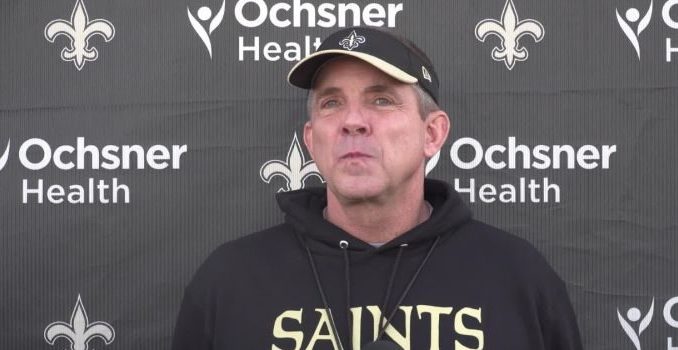
I read Nick Underhill’s tweet several hours before writing this column. I haven’t truly processed it.
“Sean Payton is retiring, per source.”
Cuts right to the heart of the matter, no? After 16 years leading the New Orleans Saints, the Sean Payton era is over.
16 years. And man, what a ride he brought us on.
I feel very comfortable saying that while there have been better coaches in NFL history, and many, many worse, nobody will ever have a career that quite mirrors Sean Payton’s in New Orleans. This run was an absolute one-of-a-kind artifact.
With respect to Jim Haslett, there have been two Saints head coaches who truly mattered in my lifetime, in terms of shaping the franchise: Jim Mora and Sean Payton. Mora took a franchise that was perpetually out of its depth in the NFL and turned it into a professional, respected – and winning – operation.
Several years after Mora’s departure, Payton picked up the pieces of a team that fell into decline before its utter destruction at the hands of Hurricane Katrina. He brought it to heights I would have never imagined.
The Super Bowl was of course the unforgettable apex. But Payton’s impact carries far beyond the Lombardi Trophy. Saints football now, and Saints football 17 years ago and prior are two very different entities. Once, we dreamed of a contender. Under Payton, eventually, a winning campaign was more often expected than not. For two different stretches – I would say 2009-2011 and from 2017-2020 – the Saints were universally in the conversation as the NFL’s best team from week to week, and if not, they weren’t far from that talk.
The shards of Haslett’s final pre-Katrina Saints team, off a 3-13 nomadic season, were what Payton would start with, and he ended with much more, taking the Saints to the NFC Championship in his first season as a head coach.
Drew Brees was considered a major injury risk after hurting his shoulder in his final year with the Chargers. But while the it’s well-remembered that Payton and the Saints took a shot on his health, let’s also recall that while Brees was a Pro Bowler in San Diego, he largely conducted a very conservative, run-first offense. Payton saw more in him – much, much more, and he emboldened Brees from year one onward to assault the NFL record books.
Payton always knew how to craft an elite offense. The Super Bowl team was one of the best in that regard. But his true Mona Lisa, his offensive masterpiece, took the field two years later.
The 2011 Saints were a virtually perfect offensive unit. Marques Colston and Jimmy Graham as big targets over the middle and down the seam. Darren Sproles darting out the backfield to turn short passes into easy yards and big gains. A strong, versatile offensive line. And two nuclear warheads on the outside – if you even thought about bringing extra attention to Graham, Colston or Sproles, Brees would simply take his one-play touchdowns to his track stars, Devery Henderson and Robert Meachem on the outside. That team was unbeaten at home – all but one of those games was a laugher by the fourth quarter, if not by halftime.
Years later, he would reshape the team and his style of play calling. A former quarterback, he always loved the passing game. But as Brees grew older, we saw the renaissance of the Payton Saints – Alvin Kamara and Mark Ingram punishing defenses for four quarters as Brees sliced teams up underneath, virtually eliminating interceptions. Like the pass-first Saints’ teams of before, this one also finished among the league’s top offenses each year, just via a different avenue.
He was always a presence here in New Orleans, but make no mistake, other NFL fans knew well of Sean Payton. He was not one to blend in – Payton was bold, and for a Saints’ franchise that had too often done nothing to stand out, he changed that. “Ambush” will live on forever, the onside kick that set the tone for the second half of the team’s Super Bowl victory.
But as much as Ambush is likely his defining moment, I almost as fondly remember one of his calls that didn’t go so well.
Facing the Tampa Bay Buccaneers in 2007, the Saints had the ball with just under four minutes left and a 23-20 lead. A couple first downs would end it, and everyone in the Superdome expected a heaping helping of Deuce McAllister to secure exactly that.
But Payton had a play in mind. He called a reverse – Bush and Henderson botched the exchange, and the Bucs recovered the fumble, setting up a go-ahead touchdown and the win.
Naturally, this play call dominated sports talk conversation around New Orleans for the next several days – Payton’s more-than-willing outlook on making “genius or goat” playcalls and the fandom’s ensuing reaction was another defining quirk of his tenure here – and Payton pretty much had to listen to it until the Saints faced off with the Falcons the next Sunday.
The first play of the game: Payton called a reverse, of course.
Tuesday’s announcement was not the first time Payton has had to step away from his team, of course. He was at the center of controversy entering the 2012 season due to the infamous Bountygate scandal, resulting in his one-year suspension from the NFL. That indirectly led to the door slamming shut on the team’s championship window following the aforementioned 2011 season – and directly to Commissioner Roger Goodell becoming the bane of Who Dat Nation.
That suspension was an example of another trend during Payton’s tenure here: the wins flowed in year after year, and the highs were high – but the lows were absolutely devastating.
The team suffered a trio of the most excruciating playoff losses in NFL history, each arguably escalating from the last. The 2011-12 season loss at San Francisco was a heartbreaker, a back-and-forth shootout seemingly in hand for the Saints – they had the Joe Montana in this matchup now, and he’d just put his team ahead. But an ill-timed blitz spring Vernon Davis loose, leading to a 49ers game-winning touchdown.
Several years later, Stefon Diggs and the almost inexplicable Minneapolis Miracle eliminated one of the strongest Saints’ teams in franchise history from the postseason.
One year later, the NOLA No-Call stripped Payton and his team of a game rightfully won and the opportunity to go to the Super Bowl. More than anyone else, Payton may have suffered the most hurtful blow here: while Brees’ Hall of Fame ticket was and is secure, a second Super Bowl win would have almost certainly made Payton a shoo in for enshrinement. Instead, he had to settle for a new replay rule for pass interference penalties, one that was ignored by officials for a season before being abandoned.
For all of the career retrospective written above, it should be noted: Payton did back off of the word “retirement” at Tuesday’s press conference, and did not rule out a return to coaching down the line. From a coach, that usually is code for: Yes, I will be coaching down the line. We may one day soon have to see Payton coaching against the Black and Gold on another sideline. And, if so, that’ll be strange.
But he gave us the most exciting, memorable and successful 16 year run in Saints history. Whatever he wants to do, he’s earned the right to do that.
Thank you, Sean.





Be the first to comment